Nowadays, search engines no longer just give links to web pages. They now offer a series of features, such as summaries, text or image generation, and chatbots that directly answer questions.
This makes online information search easier.
Even if Google has been dominant for a while, the rise of artificial intelligence has prepared the ground for other competitors that offer unique advantages.
AI-powered search engines are a new breed and completely redefine the online search experience as we know it.
In this article, let's discover 12 new alternatives to Google based on AI. 🔎🤖
The best AI-powered search engines
Just as artificial intelligence influences SEO or allows us to automate copywriting, nowadays, there are an increasing number of AI-powered search engines.
Let's have a closer look... 🕵
1. Andi Search: AI online search without ads
Andi Search is an AI startup that offers a new way to explore the Internet.
This search engine stands out thanks to:
-
direct responses: Andi analyzes your request and sends you short and factual responses by summarizing information from different sources.
-
conversational search: You can start a conversation with Andi, refine your request, or ask additional questions.
-
results without ads: No ads block your search.
Andi is more than a textual search engine
Humans like visual things, and Andi presents information in the form of both text and images.
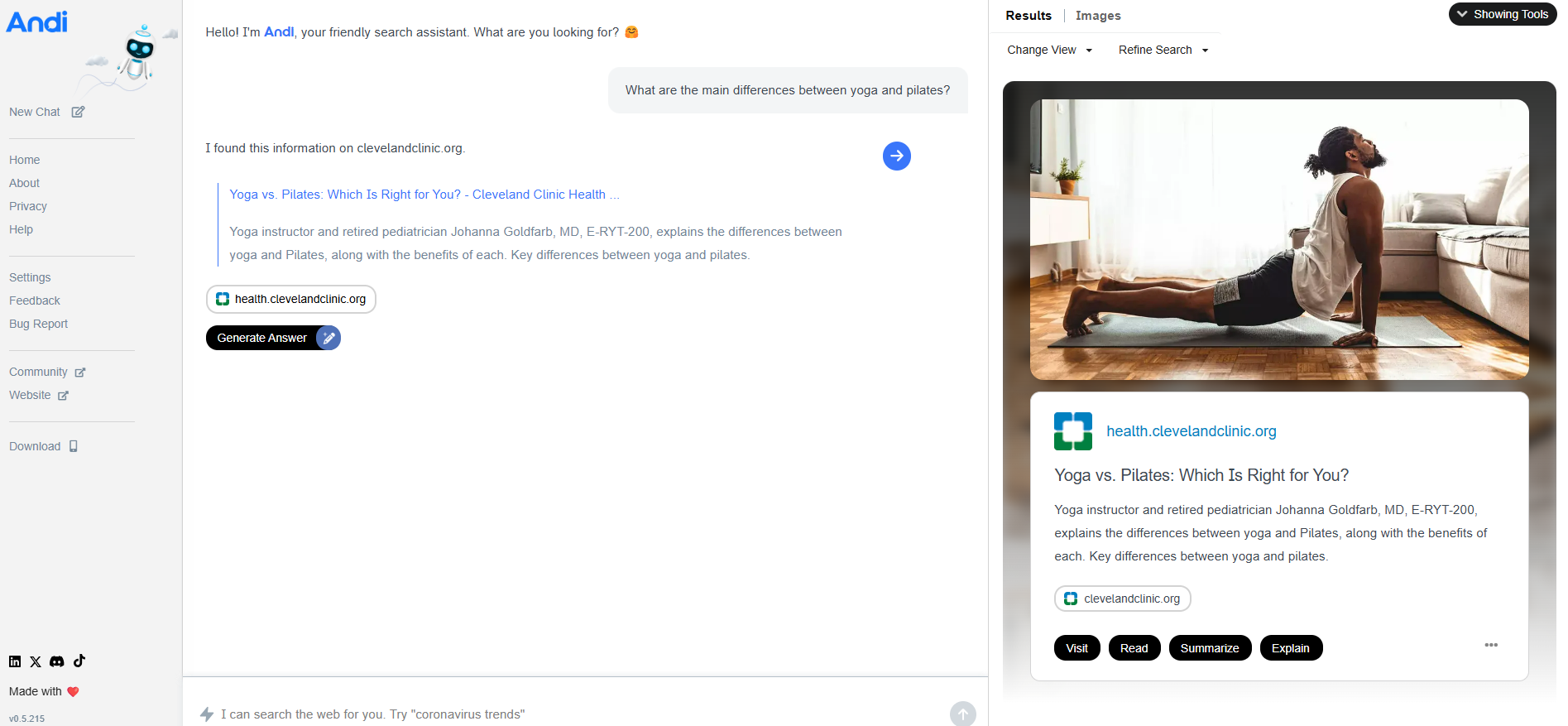
This AI search engine offers search results based on keywords, answers complex questions in different parts, and perfectly understands natural language.
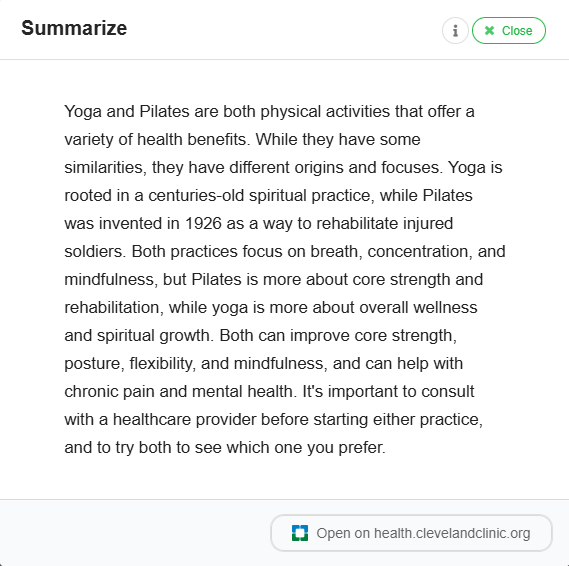
What do the AI search results on Andi look like?
On Andi, search results aren't in the form of the standard 10 blue links. Instead, they consist of the main image and text from the web page.
What are blue links? 🤔
They refer to the first standard links we see in Google search results.
An AI search engine respecting privacy
Andi is a company committed to respecting privacy. It doesn't store cookies, doesn't share data, and employees can't access user information.
It also blocks Google tracking technology so that Google can't follow you on Andi.
2. Exa AI: The best AI-powered search engines
Many startups offer new ways of displaying web data by harnessing AI. This approach excludes traditional crawlers (= Google robots).
Exa AI, formerly known as Metaphor, is a great example.
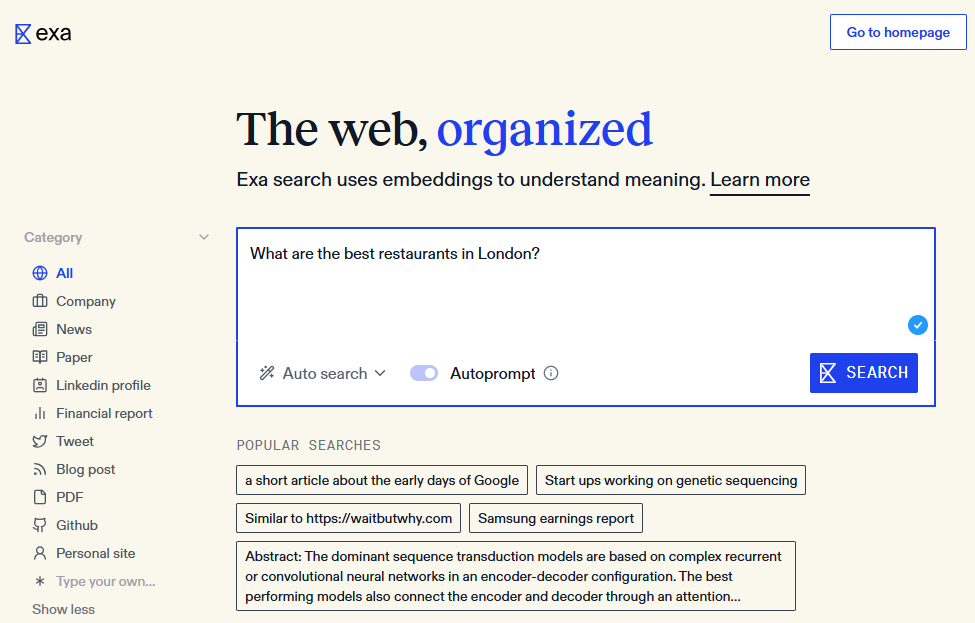
AI-driven web search with Exa
If you use Exa, it's important to remember that it's not a traditional search engine - it's based on links. 🔗
Users can choose different types of link to display:
- tweets
- press
- news
- pdf
- podcasts
- movies
- songs
- GitHub
- companies
- personal sites

3. Brave AI: An AI search engine that protects privacy
Brave Search is a search engine that uses its own LLM (= large language model, an IT program that allows machines to understand human language) to evaluate web pages and provide a summary. This feature, called Summarizer, can be disabled by users if they wish.
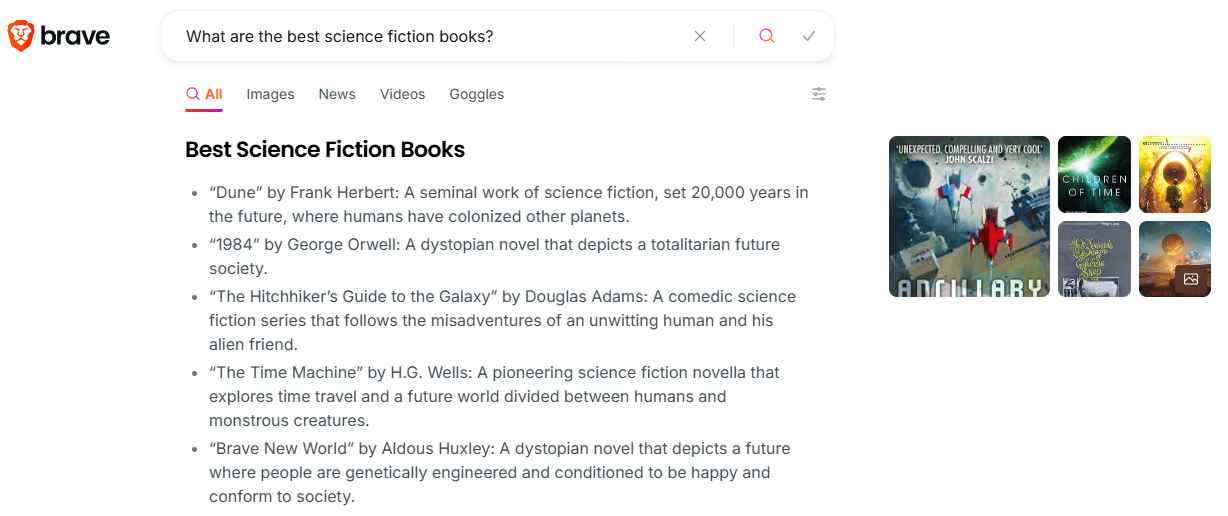
4. YOU AI Search Engine: More than just a search engine
You is an AI search engine that answers questions in a natural language, mentioning links to websites and videos, offering complete coverage of the subject.
It's available on the Web, as an application for Android and iPhone, and as a Chrome extension.
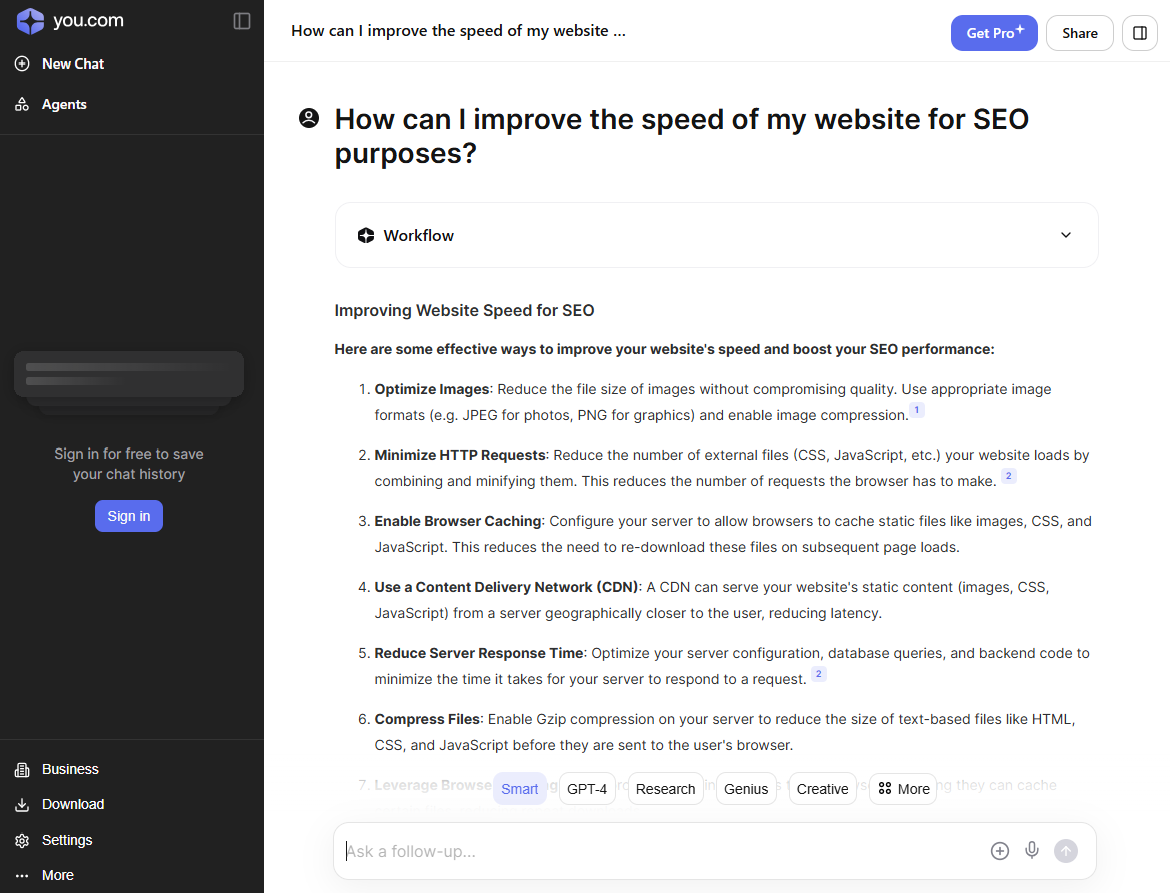
Here are its main features:
-
Chat: You has an AI assistant (YouChat) integrated directly in search experience. Ask questions and get instant responses.
-
Search applications: Instead of just displaying links, You.com provides tools near traditional web results. These tools allow deeper interactions with websites, such as articles reading, code snippet searches, or following social profiles.
-
Customization: You have control! You can review applications to customize your search results, and prioritize information sources you trust.
-
Respect for privacy: You.com doesn't sell users' data to advertisers.
5. Phind.com: An intelligent search engine for developpers
Phind is an AI search engine designed specifically for developpers. 👨💻
Instead of providing basic links, Phind delivers direct responses, comprehensive instructions, and step-by-step advice to help developers solve their problems quickly and effectively. You can think of it as a combination of a traditional search engine and an intelligent assistant for programming.
Phind stands out with the following features:
-
Direct responses: The search engine doesn't just direct you to resources, it also analyzes your request and provides solutions, code snippets, or explanations.
-
Contextual understanding: The software understands the context of your codebase and can adapt its responses accordingly.
-
Proactive assistance: The chatbot answers clarification questions, suggests alternative approaches, and anticipates potential problems you might encounter.
-
Step-by-step advice: Need help building a comprehensive application? Phind can break down difficult tasks into manageable steps, guiding you through the process, from creation to realization.
-
Multi-source integration: The AI assistant browses the Web, your local codebase, documentation, and other relevant resources to offer comprehensive results.
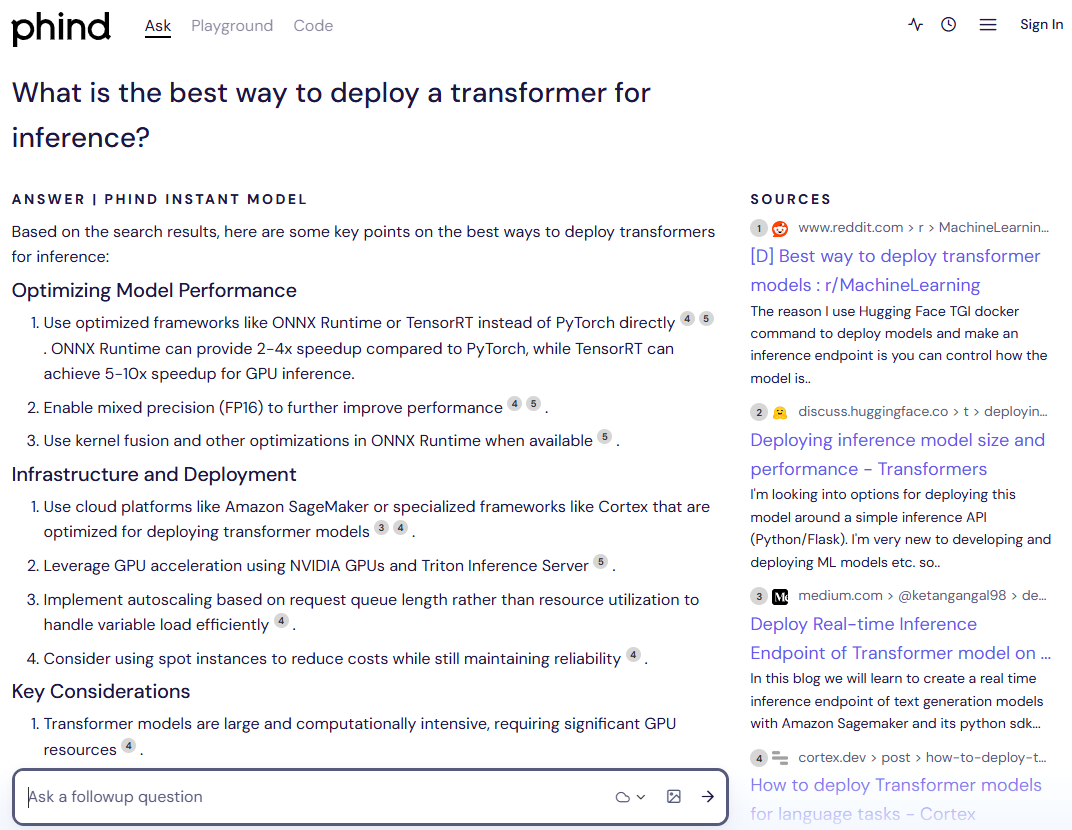
Phind can also be used as a traditional AI search engine
Phind also works as a traditional search engine, providing responses from reliable websites.
A drop-down menu at the top of the screen enables users to choose between GPT-3.5 Turbo, the Phind model (with limited uses), and GPT-4 (also with limited uses).
Users can sign in to save their discussions.
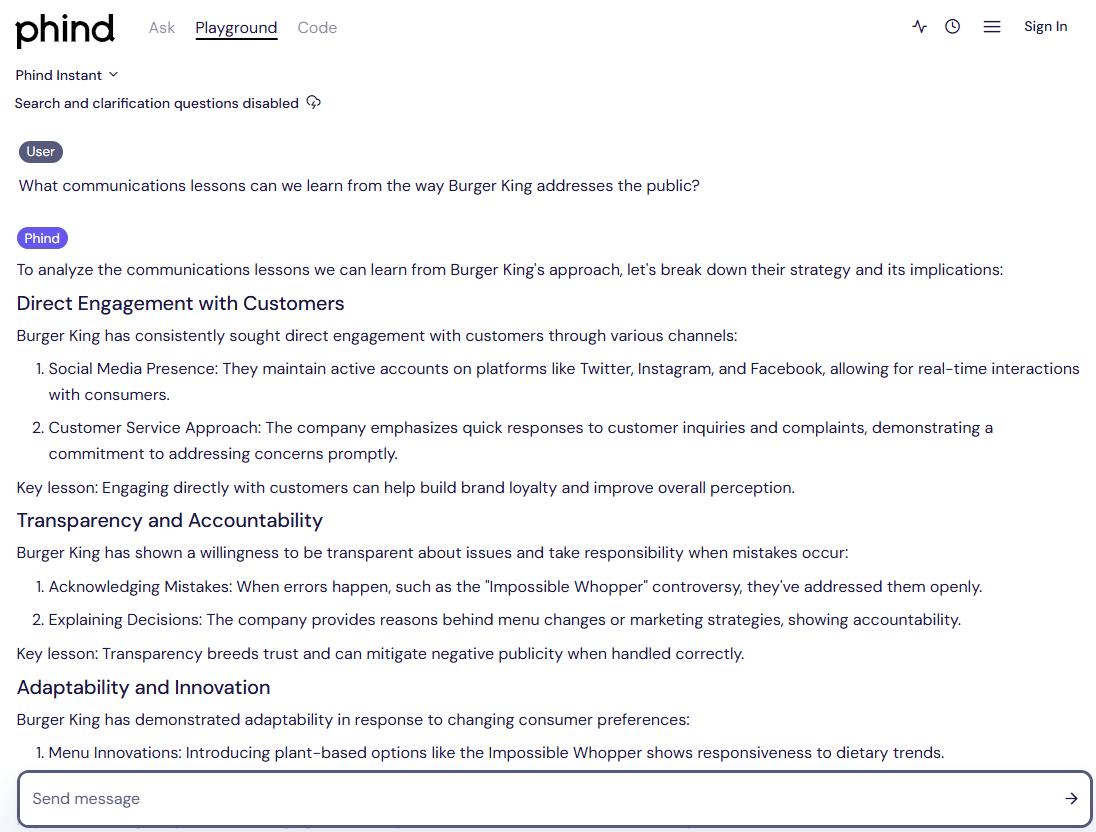
What do the AI search results on Phind look like?
Phind results are tailored to your programming needs:
-
Code snippets: Ready-to-use code blocks that directly solve your problem.
-
Explanations and tutorials: Detailed explanations of concepts and step-by-step tutorials to guide you through complex tasks.
-
StackOverflow responses: StackOverflow discussion threads filtered according to your specific context.
-
API documentation: Links to API documentation and examples of relevant code.
6. Perplexity.ai: An AI-powered search engine
Perplexity.ai is a serious competitor in the AI search field.
The search engine answers users queries in natural language.
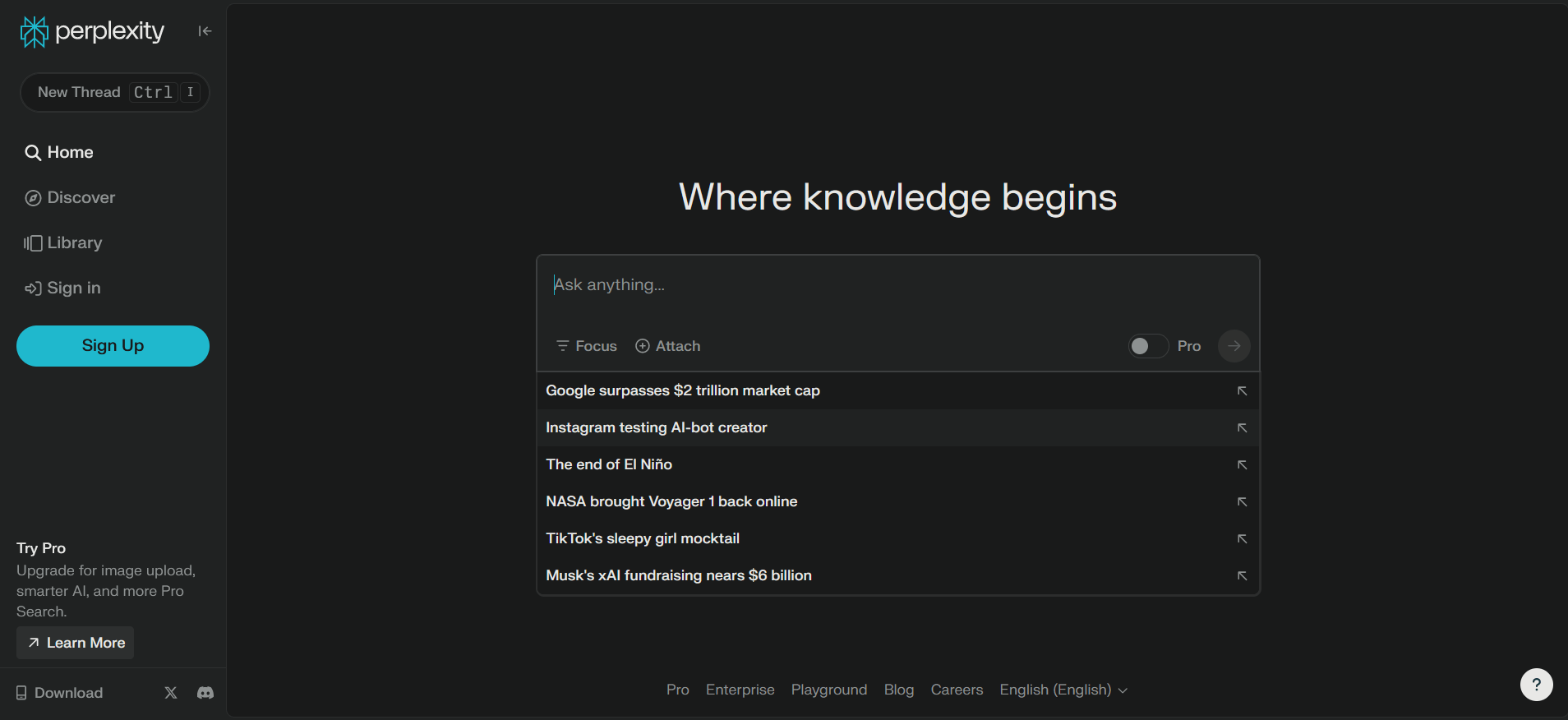
The program is powered by LLMs, internet data, and an updated version of the Google PageRank, which creates a knowledge graph that gathers links to reliable websites.
What is PageRank?
It's a rating system that evaluates the quality of a website.
Perplexity AI features
Perplexity redefines the way we discover the information on the Web. It provides internet users with:
- Precise and insightful responses: It understands the context of your request and allows users to generate code, summarize articles, or write emails.
- Transparent sources: All sources are displayed, enabling users to evaluate the credibility and partiality of the information.
- An organized library: Users can organize their search results in "Collections" by project or subject.
- Collaborative discovery: Features like Copilot allow users to discuss with AI, refine research, and explore related subjects.
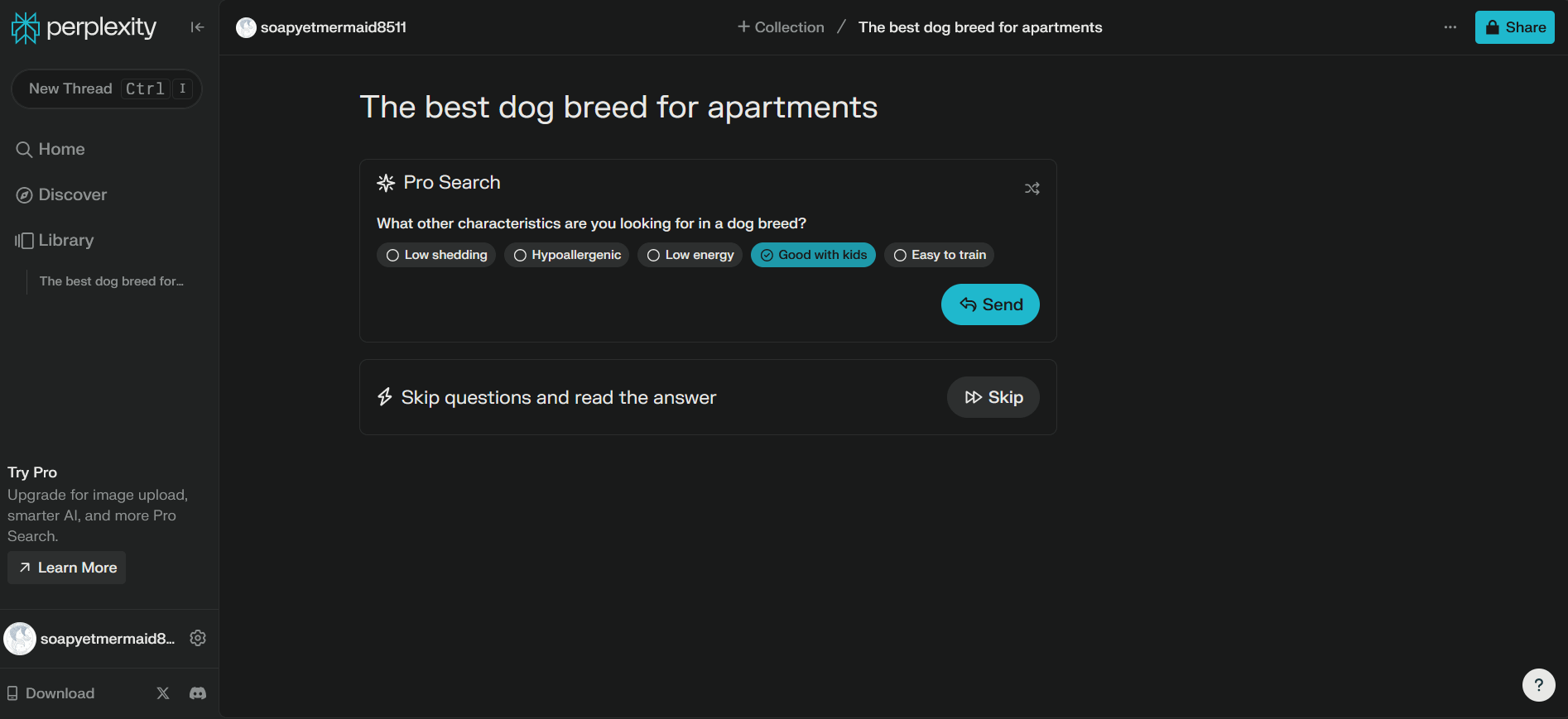
- The possibility of interacting with data: Perplexity enables users to ask questions about their own files and conduct Web searches within the platform, providing a comprehensive vision of the project in a single place.
- Perplexity Pro: Access additional features, such as advanced search and custom results filters, for a more tailored experience.
7. Bing: A comprehensive search engine powered by artificial intelligence
Microsoft Bing has been significantly improved since its launch.
You can now search for specific responses and receive a results summary. Moreover, you can interact with the AI chatbot to ask additional questions about documents, implement ChatGPT plugins, and create graphics on the Bing platform.
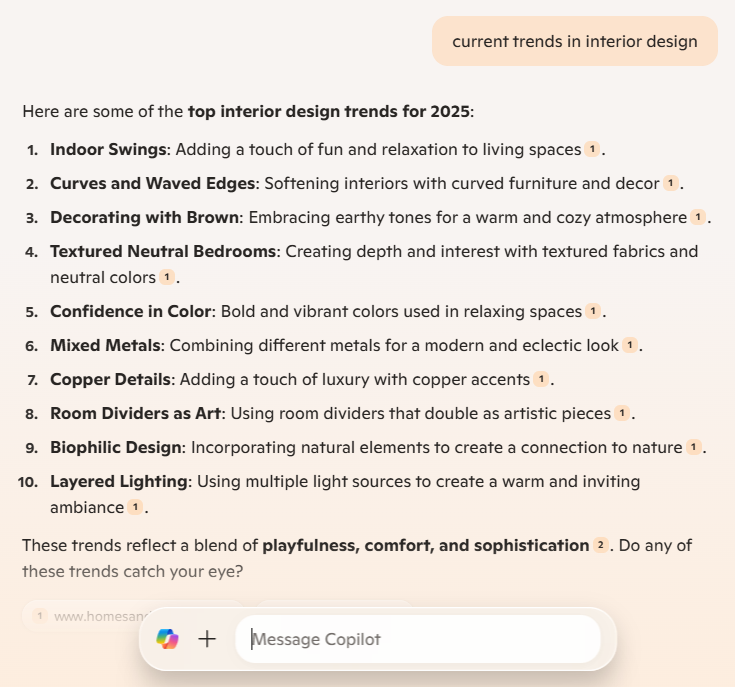
What are the essential features of Bing?
- Conversational search: Ask your questions in natural language, and Bing AI will try to understand them and answer directly by providing information from different sources.
- AI-driven content creation: Generate texts such as poems, scripts, emails, and code thanks to creative tools.
- Image creator: You will be able to find illustrations depending on context and relevance. It's very useful if you are searching for visually similar images or information about a specific visual element.
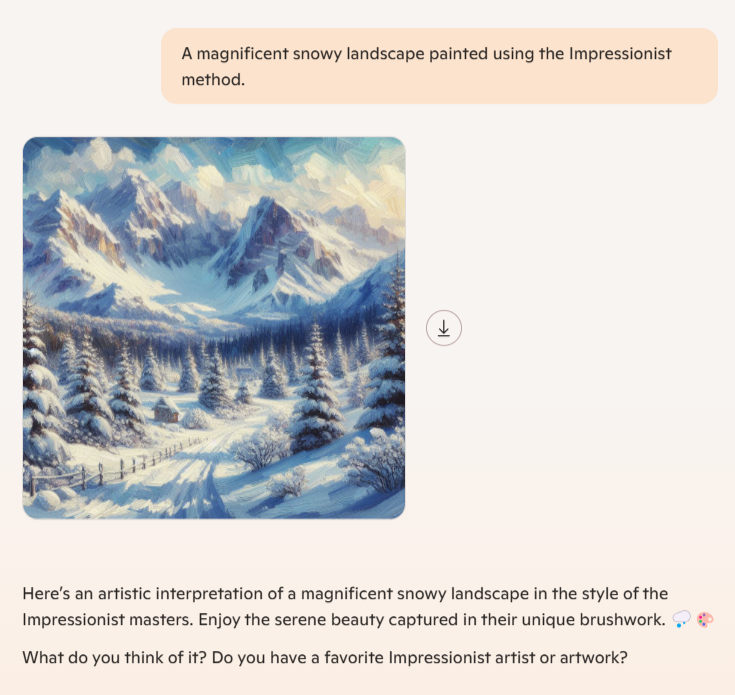
- Custom results: Bing AI relies on your search history and preferences to tailor future results to your needs.
- Microsoft integration: Transparent integration with other Microsoft tools for a unified experience.
Komo AI provides a precise, private, and fast search experience with no ads.
The search engine suggests links to videos, images, and websites to make detailed search easier.
It's a powerful AI chatbot trained on a wide range of data sources, making it a strong and effective search tool.
The best advantage of Komo AI is its simplicity. On the homepage, you'll only see a search bar, and after typing a request, you get minimal and relevant results, instead of an entire page full of content.
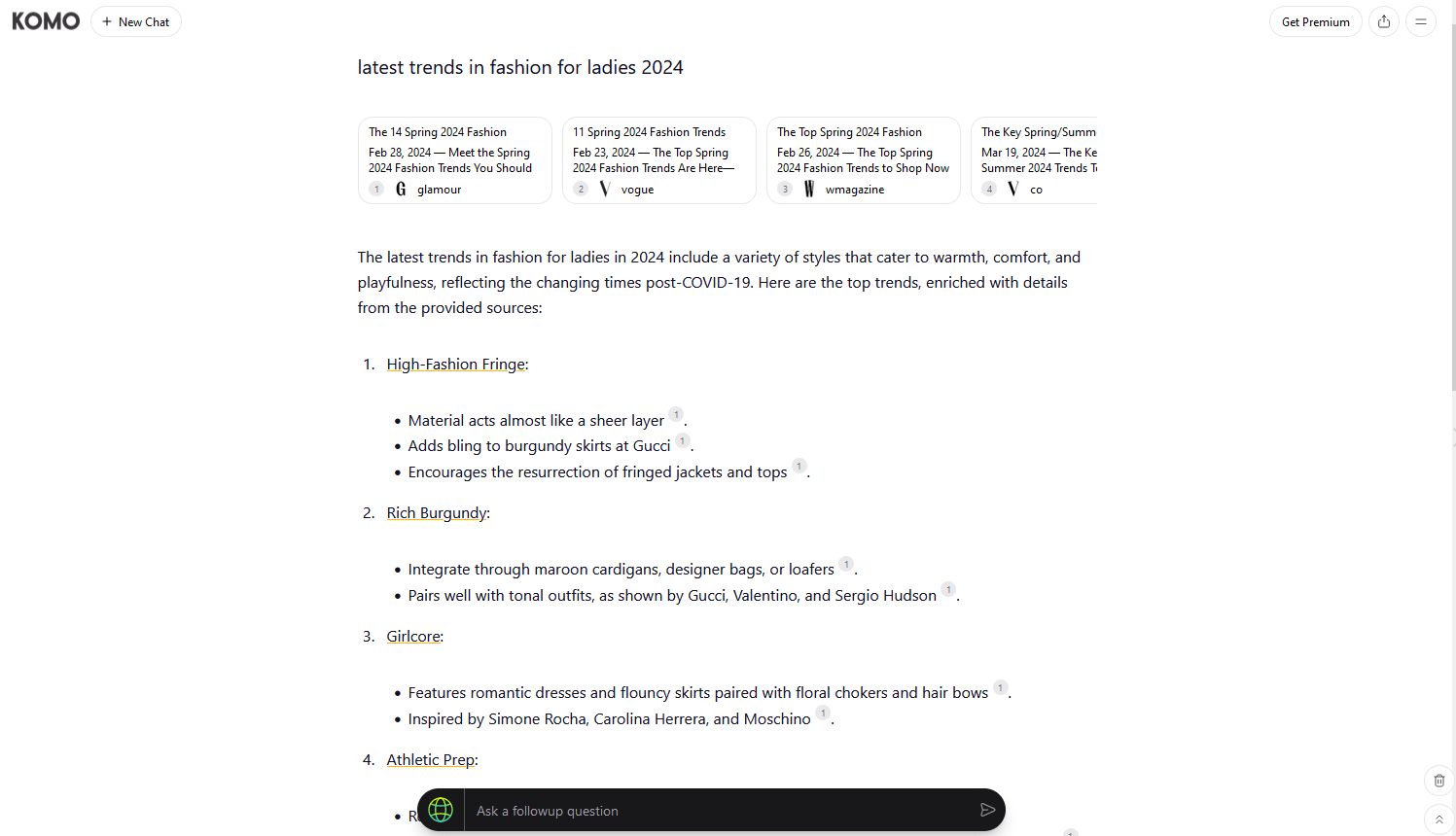
What is the benefit of Komo for your online searches?
Komo aims to provide more than simple clicks. It summarizes information, answers specific questions, and generate texts - such as poems or scripts - based on your request. 🖊️📜
9. Yep: An AI software that rewards content creators
Yep respects privacy and has no ads.
The search engine focuses on search quality by leveraging content, links, and natural language processing to provide users with relevant and precise results.
Now, Yep offers an AI chatbot feature. You can ask additional questions and receive fast, concise responses.
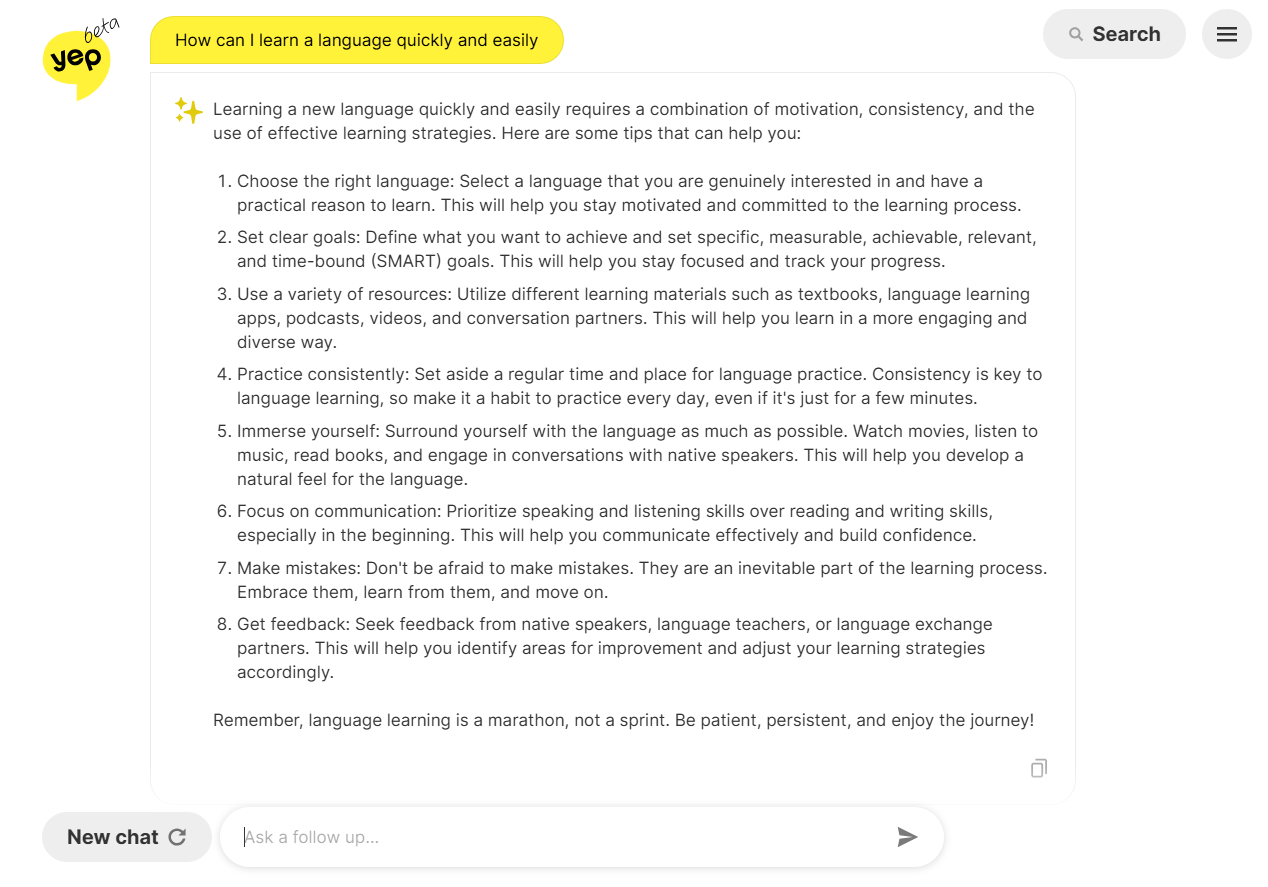
Yep.com, income-sharing search results
Yep.com aims to revolutionize the online search sector by rewarding content creators. The search engine strives to share 90% of advertising income with them.
Here are other remarkable features of YEP:
- Neutral search: Yep claims to give priority to natural results based on their relevance and quality, rather than customizing results according to past searches or other factors.
- Transparent algorithm: Yep's ranking algorithm is accessible to the public for examination.
- Beta version: Currently in beta version, Yep is still improving its features.
10. Waldo: An AI-powered search assistant for professionals
Waldo is an AI-powered search assistant that aims to go beyond traditional search engines like Google.
Instead of providing a basic list of links, it focuses on producing high-quality data production from the Web, especially for professionals.
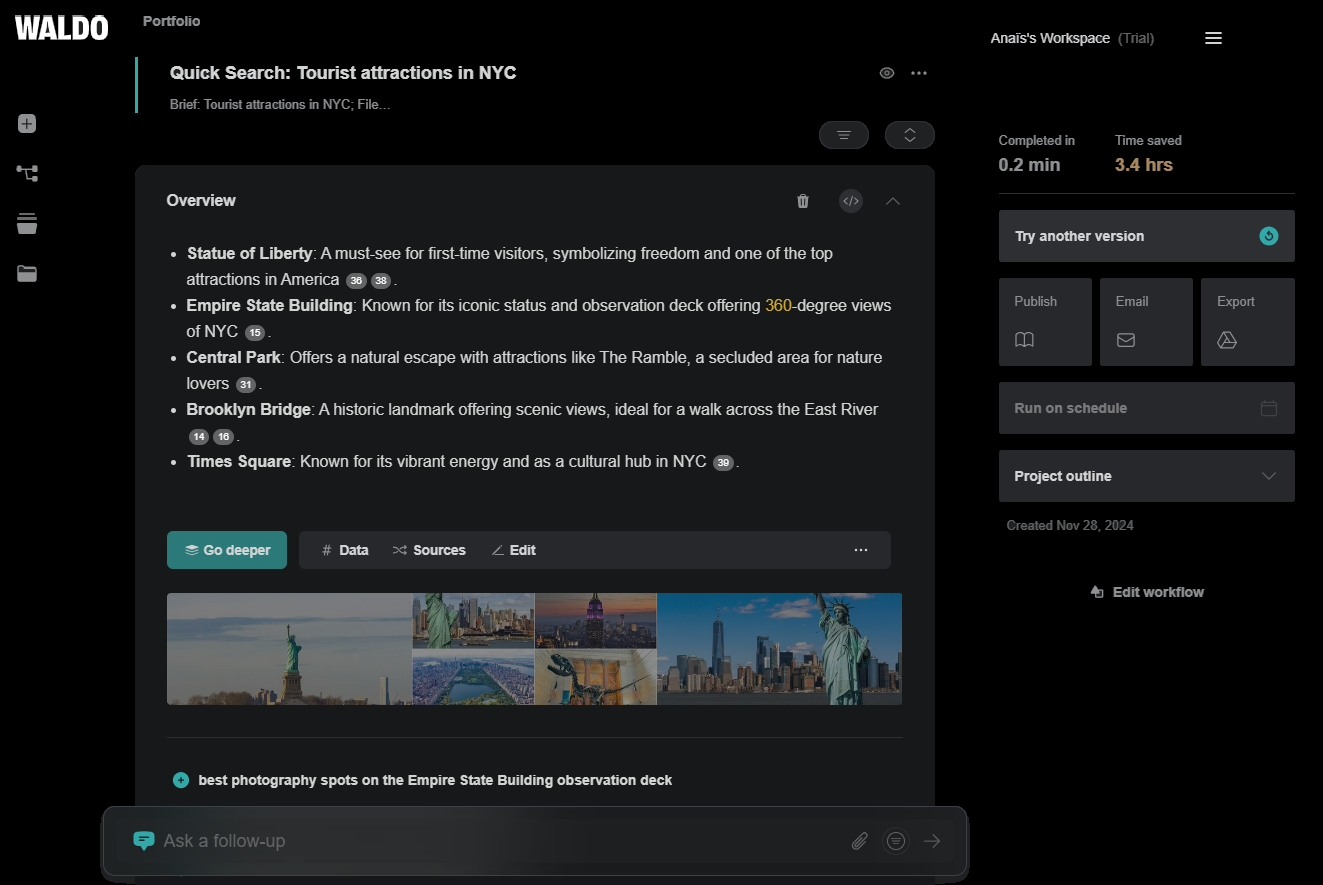
What are the advantages of Waldo?
- Automated proccess: Waldo can handle complex search tasks, such as creating plans, extracting key information, and presentating it in an editable document.
- Comprehensive research: You can refine your requests with filters, focus on specific data points, and give prioritize reliable sources for accurate information. 🎯
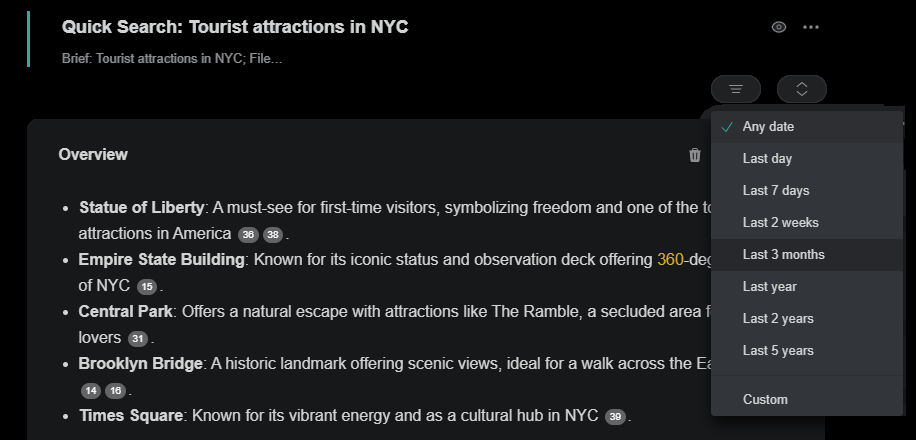
- Fact-checking: Waldo mentions its sources and relates them, enabling users to verify information and foster a climate of trust.
- Transparent collaboration: Share your searches with colleagues and export data for deeper analysis.
How Waldo works?
Waldo doesn't browse the Web directly like Google. Instead, it gathers search results by focusing on high-quality sources, such as university documents, industrial reports, and press articles.
It then analyzes these results and presents them in an organized and relevant way.
11. Google Gemini redefines online search thanks to AI
Google Gemini, formerly called Bard, is another conversational AI search assistant.
Unlike traditional search engines that rely on keywords, Gemini understands natural language nuances and provides complete responses to your questions.
What are the specificities of Google's AI engine, Gemini?
- Conversational interface: Gemini initiates an open dialogue that allows you to refine your search as you go. 🗣️
- Contextual understanding: The search engine goes beyond keywords to understand the context of your request. It takes into account your previous questions from the ongoing conversation and your search history.
- Multiple results: Gemini doesn't stop at providing links; it can generate different types of texts, such as poems, codes, scripts, emails, letters, and more.
- Knowledge integration: The software gathers information from multiple sources to provide a comprehensive understanding of the subject.
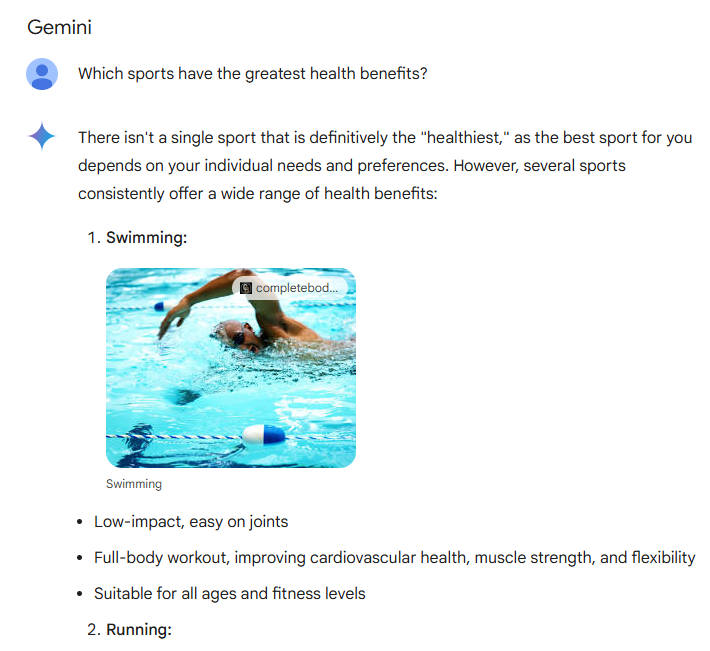
12. Aria by Opera: an AI search engine in your browser
Aria by Opera is an AI-powered search engine directly embedded in the Opera and Opera GX browsers.
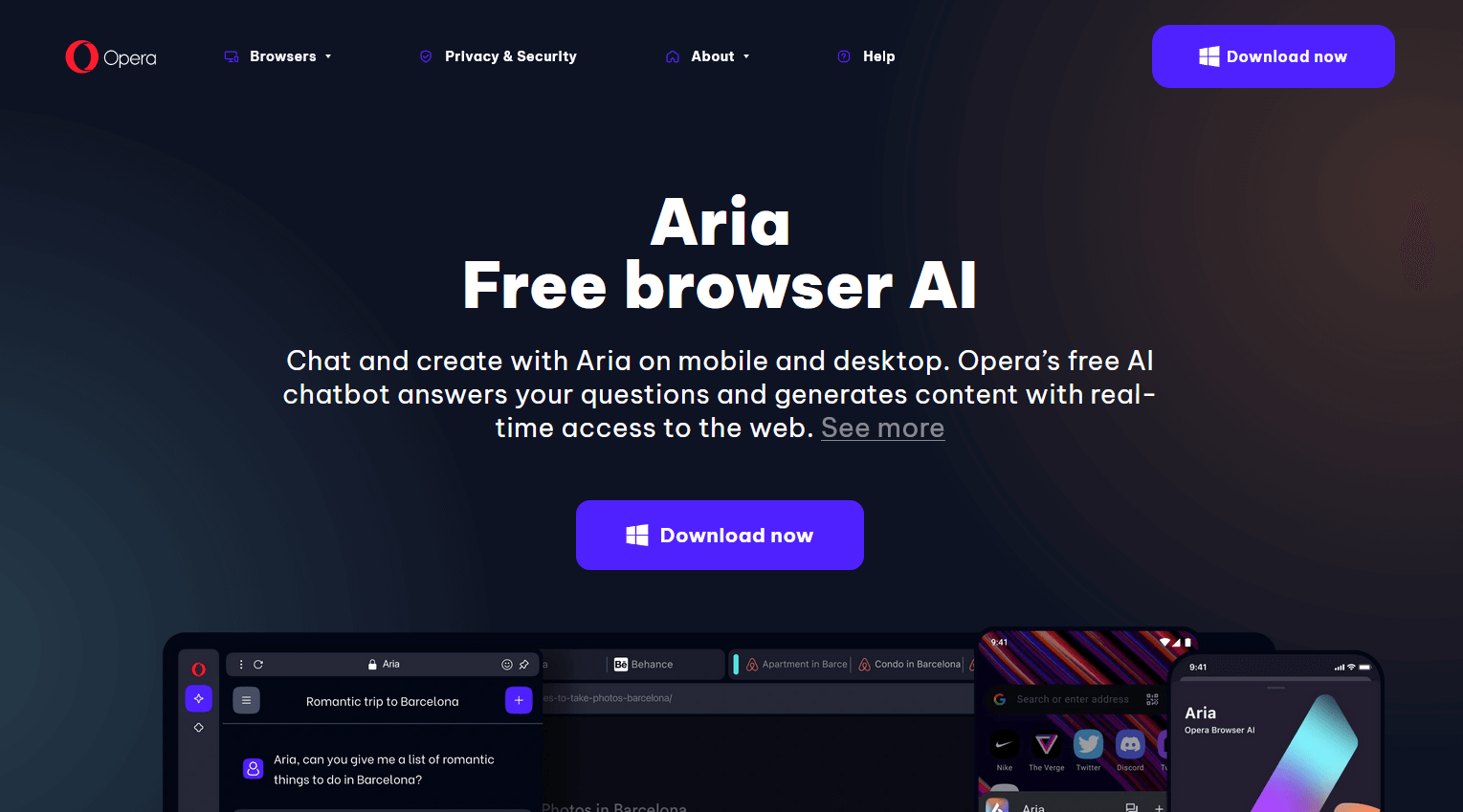
Aria's essential features
- Real-time web access: Aria is constantly connected to the internet, enabling you to access updated information.
- Contextual understanding: The search engine goes beyond keywords to understand the intention behind your search.
- Custom results: Aria learns from your browsing habits and preferences to customize your experience.
- Multiple search formats: The software handles textual, vocal, and visual searches.
- Embedded AI assistant: Aria answers your questions directly on the results page, eliminating the need to switch between websites.
Conclusion on AI-driven online search
The traditional 10 "organic" blue links are increasingly becoming a thing of the past.
If you are looking for solutions that are more respectful of privacy, offer a summary system, or provide a more visual search experience, you'll likely find what you're looking for in this list of AI-driven search engines. Companies like acropolium are also exploring innovative AI solutions that reshape how we search, analyze, and use information online.
These tools are definitely at the forefront of transforming how we access information on the Internet... 🦾✨



















